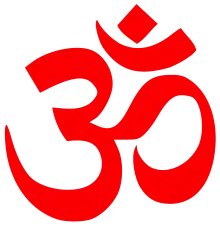Garga Hora
Garga Horā[1] is a very ancient treatise on the predictive part of Hindu astrology. Its author, Ṛṣi Garga, is one of the sages of the Purāṇika times. He was the son of Ṛṣi Bharadvāja. There are 8 Siddhāntas of Hindu astrology, they are – Brahmā, Sūrya, Soma, Vasiṣṭhta, Pulastya, Romaka, Arya, and Garga Siddhāntas – the last named is named after the author of Garga Horā, and Garga Saṁhitā,[2] and with whom Jyotiṣa is associated.[3] Garga Horā is written in the Sanskrit Sutra – format and from this work Varāhamihira has drawn profusely.[4] Incidentally, both, Garga and Varāhamihira, have in their respective works referred to the proficiencies of the Greeks in the field of Astronomy.[5]
| Author | Ṛṣi Garga |
|---|---|
| Country | India |
| Language | Sanskrit |
| Subject | Astrology |
| Part of a series on |
| Hindu scriptures and texts |
|---|
 |
| Related Hindu texts |
Parāśara is considered to be most ancient of Hindu astronomers, and second in order of time is Garga, whom Gauranga Nath Bannerjee, while agreeing with Dr.Kern, places in the 1st Century B.C.[6] Bala Bhadra, the author of Horā Ratnaṁ, and whose method is considered to be more authoritative in South India was greatly influenced by Garga.[7]
References
- "Garga Horā" (PDF). Archived from the original (PDF) on 2012-12-02.
- C.Roberts. What India Thinks. NewDelhi: Asian Educational Services. p. 303.
- Shanta N.Nair. Echoes of Ancient Indian Wisdom. New Delhi: Pustak Mahal. p. 230.
- Ramakrishna Bhat. Bṛhat Saṁhitā of Varāha Mihira (2 Volumes). New Delhi: Motilal Banarsidass. p. 5.
- P.D.Sharma. Hindu Astronomy. Global Vision Publishing House. p. 130.
- Gauranga Nath Banerjee. Hellenism in Ancient India. Mittal Publications. p. 159,161.
- Gopesh Kumar Ojha. Phaladeepika. New Delhi: Motilal Banarsidass. p. 537.